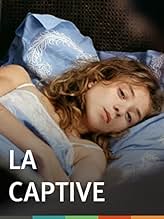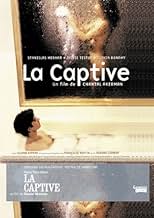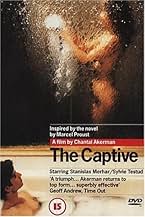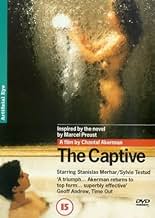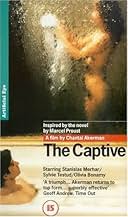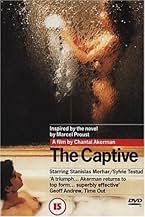VALUTAZIONE IMDb
6,0/10
2270
LA TUA VALUTAZIONE
Ambientata a Parigi, in Francia, si svolge una storia seria di un amore tragico e disfunzionale.Ambientata a Parigi, in Francia, si svolge una storia seria di un amore tragico e disfunzionale.Ambientata a Parigi, in Francia, si svolge una storia seria di un amore tragico e disfunzionale.
- Regia
- Sceneggiatura
- Star
- Premi
- 3 candidature totali
Recensioni in evidenza
A quiet, intense, low key look at the dysfunctional relationship between a very rich young man and the young woman he 'keeps' at his house. Is she trapped or is he? Who's really the captive?
Not much happens in terms of events, the film is mostly in the details, but those details are great. The two leads give amazingly subtle performances, and the photography and lighting – while never showy – are magnificent. One of the most interesting and effective 'cold' looks I've seen in a film. Beautiful compositions.
A film for those interested in complexity of character, a director using image and mood to tell a story, and patience to allow the slow accumulation of details to add up over time to something very special.
Not much happens in terms of events, the film is mostly in the details, but those details are great. The two leads give amazingly subtle performances, and the photography and lighting – while never showy – are magnificent. One of the most interesting and effective 'cold' looks I've seen in a film. Beautiful compositions.
A film for those interested in complexity of character, a director using image and mood to tell a story, and patience to allow the slow accumulation of details to add up over time to something very special.
This is a subtly faithful interpretation of Proust's The Prisoner in which Chantal Akerman makes chasers and voyeurs out of her viewers, craning to see around street corners, straining to make out desired shapes behind warped glass. While the camera pursues the truth about Ariane, who seems to be forever drifting away, we remain fixed in the claustrophobic world of Simon's preoccupied anxiety. As did Proust, Akerman opens a space for the exploration of co-dependent attachment, not only love, and the painful reality of the search for self- avoidance. The Prisoner leaves the viewer caught between the (apparent) bliss of Ariane's ignorance and Simon's monomaniacal certainty. For me, this is the closest French cinema has come (up to now) to bottling the elusive Albertine scent. The silent film reel that plays during the film's opening too recalls the playful beaches of Balbec In the Shadow of Young Girls in Flower, foreshadowing undoing and tragedy. A film for anyone who understands obsession.
Modern day adaptation of a section of Proust's magnum opus that is true enough to the book in its theme and events and interestingly has the Marcel character still sunk in an archaic, aristocratic world.
KD Lang lookalike Stanislas Merhar does a good job doing the insulated, emotional (and physical) frailty, trapped in an adolescent infatuation of towering poetic naivety, all the while consumed with jealousy by the suspicion that his live-in girlfriend is an active lesbian behind his back.
It's slow. There's a lot of prowling around his creaking Paris apartment, lots of talking in cars - we seem to be taking entire journeys in real time. Akerman gave herself an easy directing job. The use of classical music is lazy - Schubert's Arpeggione Sonata is suitably Proustian, but Rachmaninov's Isle of the Dead is absurdly melodramatic, especially when played incongruously, Godard-fashion, over serene images.
Those familiar with the writer and director can easily pull back the gauze to reveal the real issues - an inverted couple struggling to maintain a hetero relationship - but that is so superficial it hardly seems worth special effort and the film works better with the ambiguity in place (as intended), with the implication that naivety (misunderstanding, confusion) is at the root of jealous passion. The Marcel character is so naïve that in the sex scenes he doesn't even know that he is supposed to put it in - doing the movements without getting undressed (he's in bed in his overcoat in one scene). That was strangely tragic, and although it may have been a stylisation to symbolise their failure to connect, it was easier to take it literally.
With liberties like that though, and done so earnestly, it's craves some indulgence. The worst problem is that the girl is comatose and unattractive, showing nothing of Albertine's sprightliness and guile that gave that character her painful duplicity. The ending too is a disappointment.
KD Lang lookalike Stanislas Merhar does a good job doing the insulated, emotional (and physical) frailty, trapped in an adolescent infatuation of towering poetic naivety, all the while consumed with jealousy by the suspicion that his live-in girlfriend is an active lesbian behind his back.
It's slow. There's a lot of prowling around his creaking Paris apartment, lots of talking in cars - we seem to be taking entire journeys in real time. Akerman gave herself an easy directing job. The use of classical music is lazy - Schubert's Arpeggione Sonata is suitably Proustian, but Rachmaninov's Isle of the Dead is absurdly melodramatic, especially when played incongruously, Godard-fashion, over serene images.
Those familiar with the writer and director can easily pull back the gauze to reveal the real issues - an inverted couple struggling to maintain a hetero relationship - but that is so superficial it hardly seems worth special effort and the film works better with the ambiguity in place (as intended), with the implication that naivety (misunderstanding, confusion) is at the root of jealous passion. The Marcel character is so naïve that in the sex scenes he doesn't even know that he is supposed to put it in - doing the movements without getting undressed (he's in bed in his overcoat in one scene). That was strangely tragic, and although it may have been a stylisation to symbolise their failure to connect, it was easier to take it literally.
With liberties like that though, and done so earnestly, it's craves some indulgence. The worst problem is that the girl is comatose and unattractive, showing nothing of Albertine's sprightliness and guile that gave that character her painful duplicity. The ending too is a disappointment.
You have to read Proust to appreciate this movie. I imagine it was the most awful, boring treachery to subject someone to if they hadn't read La Captive. Ackerman is actually quite witty in portraying the mental restlessness of the characters, especially Ariane/Albertine constantly being caught in her poorly planned deceptions). In addition to this her visual portrayal of Proust's themes of desire and dissatisfaction are very poignant(although sometimes uncomfortable). An example being the bathing scene, where Simon/Marcel is most vulnerable and unselfishly sensual (I say unselfishly because of the contrast of the other sensual scenes where Ariane is sleeping) but this is only possible for him because of the distance and physical barrier between them. Ackerman is not entirely successful at putting Proust's La Captive on film, but she does make a beautiful, simplified attempt.
Though maintaining a very low-key tone, this immediately looks and feels so very different from Chantel Akerman's earlier films ('Je tu il elle,' 'Les rendez-vous d'Anna,' and especially 'Jeanne Dielman') that I had to periodically check to make sure I was watching the right movie, and one of hers. Music is prominent at intermittent points (very much enriching the proceedings whenever it does crop up), and the soundtrack is generally kind of busy; the camera moves, and the narrative on mind is much more discrete, active, and dynamic than has been the case elsewhere with Akerman. Yet this is invariably of the same high quality one expects from the filmmaker, exquisitely crafted with all the skill and intelligence we know she possessed. It may not be readily appealing for those who seek quicker gratification from cinema, but whether one is a fan of Akerman specifically or just looking for a good, subdued drama, 'La captive' is excellent.
This retains to some extent, within the framework of a slightly more conventional drama, the minimalism that the filmmaker had mastered early in her career. There is rather little going on in a scene at any given time, and the acting is kept at a very controlled, muted tenor. Be that as it may, as director Akerman orchestrates shots and scenes with the same keen artistic eye she had shown from the start, and the feature is curious and engrossing right away. Sabine Lancelin echoes the broad airs of quiet refinement with cinematography that's crisp and vivid in capturing every shot, making the viewing experience all the more pleasing. This is all the more true in light of gorgeous filming locations, and exquisite production design and art direction, that pop out with terrific color and elegance; naturally the hair, makeup, and costume design are just as splendid, if less prevalent.
Above all, however, Akerman has conjured a story that's a bit dark and haunting in a way, and roundly intriguing and captivating. 'La captive' is thought-provoking as pensive Simon, controlling to the point of abuse, nonetheless flounders when he realizes he doesn't know everything about Ariane, and never could. Perplexing as it may be that Ariane willingly attached herself to Simon, genuine affection can't withstand the disparity between them. Both characters are shrewdly complicated, and the dialogue between them, or in Simon's attempts to gain more understanding, is absorbing in and of itself. The scene writing is stark and unexpectedly bewitching in the hushed buzz of tension that underlies this central relationship, from the coldness of early scenes to the more heightened drama of the last stretch. It's a great credit to Sylvie Testud, Stanislas Merhar, and (in a smaller supporting part) Olivia Bonamy that they infuse so much nuanced range and depth of emotion into their roles in light of what is mostly so restrained a picture, and this couldn't have the underhanded potency that it does without them.
Even Akerman's most highly acclaimed and well known movies are unquestionably best suited for a select audience. While this one bears more similarity in some ways to titles that most viewers would be more familiar and comfortable with, it's nonetheless still quite understated, and without even taking the subject matter into consideration it won't appeal to all. For my part I wouldn't necessarily say that it's as strong as some of Akerman's other works, either, though that's just a matter of personal preference. Him and haw as one might about the particulars, however, all the same I think this is very well done, a finely made, engaging, and satisfying exploration of a fraught relationship. It may not be something one needs to go out of their way to see, but if you do have the opportunity to watch then 'La captive' is well worth two hours of one's time as far as I'm concerned.
This retains to some extent, within the framework of a slightly more conventional drama, the minimalism that the filmmaker had mastered early in her career. There is rather little going on in a scene at any given time, and the acting is kept at a very controlled, muted tenor. Be that as it may, as director Akerman orchestrates shots and scenes with the same keen artistic eye she had shown from the start, and the feature is curious and engrossing right away. Sabine Lancelin echoes the broad airs of quiet refinement with cinematography that's crisp and vivid in capturing every shot, making the viewing experience all the more pleasing. This is all the more true in light of gorgeous filming locations, and exquisite production design and art direction, that pop out with terrific color and elegance; naturally the hair, makeup, and costume design are just as splendid, if less prevalent.
Above all, however, Akerman has conjured a story that's a bit dark and haunting in a way, and roundly intriguing and captivating. 'La captive' is thought-provoking as pensive Simon, controlling to the point of abuse, nonetheless flounders when he realizes he doesn't know everything about Ariane, and never could. Perplexing as it may be that Ariane willingly attached herself to Simon, genuine affection can't withstand the disparity between them. Both characters are shrewdly complicated, and the dialogue between them, or in Simon's attempts to gain more understanding, is absorbing in and of itself. The scene writing is stark and unexpectedly bewitching in the hushed buzz of tension that underlies this central relationship, from the coldness of early scenes to the more heightened drama of the last stretch. It's a great credit to Sylvie Testud, Stanislas Merhar, and (in a smaller supporting part) Olivia Bonamy that they infuse so much nuanced range and depth of emotion into their roles in light of what is mostly so restrained a picture, and this couldn't have the underhanded potency that it does without them.
Even Akerman's most highly acclaimed and well known movies are unquestionably best suited for a select audience. While this one bears more similarity in some ways to titles that most viewers would be more familiar and comfortable with, it's nonetheless still quite understated, and without even taking the subject matter into consideration it won't appeal to all. For my part I wouldn't necessarily say that it's as strong as some of Akerman's other works, either, though that's just a matter of personal preference. Him and haw as one might about the particulars, however, all the same I think this is very well done, a finely made, engaging, and satisfying exploration of a fraught relationship. It may not be something one needs to go out of their way to see, but if you do have the opportunity to watch then 'La captive' is well worth two hours of one's time as far as I'm concerned.
Lo sapevi?
- QuizChosen by "Les Cahiers du cinéma" (France) as one of the 10 best pictures of 2000 (#02).
- ConnessioniFeatured in Women Make Film: A New Road Movie Through Cinema (2018)
- Colonne sonoreL'ILE DES MORTS, Op 29
Music by Sergei Rachmaninoff
Performed by Koninklijk Concertgebouworkest (as Royal Concertgebouw Orchestra)
Conducted by Vladimir Ashkenazy
© 1909 by HAWKINS & SON (London) LTD
(p) 1984 DECCA RECORDS COMPANY LTD
Avec l'aimable autorisation de UNIVERSAL MUSIC PROJETS SPECIAUX
I più visti
Accedi per valutare e creare un elenco di titoli salvati per ottenere consigli personalizzati
- How long is The Captive?Powered by Alexa
Dettagli
- Data di uscita
- Paesi di origine
- Lingua
- Celebre anche come
- The Captive
- Luoghi delle riprese
- Parigi, Francia(setting of the whole action)
- Aziende produttrici
- Vedi altri crediti dell’azienda su IMDbPro
Botteghino
- Lordo in tutto il mondo
- 636 USD
- Tempo di esecuzione1 ora 58 minuti
- Colore
- Mix di suoni
- Proporzioni
- 1.85 : 1
Contribuisci a questa pagina
Suggerisci una modifica o aggiungi i contenuti mancanti

Divario superiore
By what name was La captive - La prigioniera (2000) officially released in Canada in English?
Rispondi
